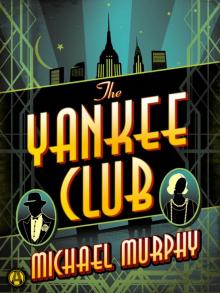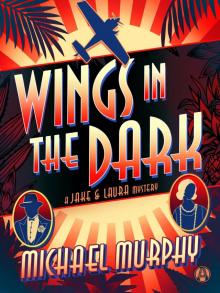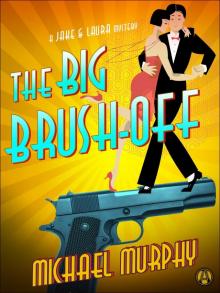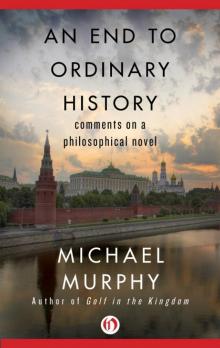- Home
- Michael Murphy
End to Ordinary History
End to Ordinary History Read online
AN END TO ORDINARY HISTORY
Michael Murphy
For Dulce
CONTENTS
Author’s Note
1
2
3
4
5
6
7
8
9
10
11
12
13
14
15
16
17
18
19
20
21
22
23
24
25
26
27
28
29
30
31
32
33
34
35
36
A Biography of Michael Murphy
AUTHOR’S NOTE
IN THE SOVIET UNION, the Mysteries have not died: so begins a CIA memorandum dated April 19, 1973. The pages that follow tell a fantastic story. A Soyuz spaceship crashed when its two pilots saw an apparition; the Soviet government commissioned a study of the cosmonauts’ visions and their relation to UFO reports; and as a result the Soviet Academy of Sciences was torn by controversy. A cousin of Sergei Kirov, Stalin’s rival for power in the 1920s, was involved, along with Ivan Strelnikov, Russia’s great pioneer of laser research.
The memorandum was released in 1979 under the Freedom of Information Act, with a few sections deleted for security reasons. Across one of its margins are scribbled the words “file in looney bin with other UFO reports,” a phrase that reflects our government’s attitude toward the whole affair. Neither the CIA nor State Department has answered my inquiries about it.
In spite of initial skepticism, I have come to believe the story. My judgment is based to some extent on my travels in the Soviet Union, but also on my faith in Darwin Fall, an American who was involved in the events described by the CIA memo. His detailed account has convinced me that the Soviet peoples’ fascination with the Mysteries has not abated during the Communist era.
This fascination is not limited to orthodox faiths, however, and is far deeper and more complex than an interest in UFOs or parapsychology. While embracing wisdoms of the past, it inspires new explorations, some of them highly experimental. The issues it raises are often debated, sometimes in the Soviet press. In 1981, for example, Komsomol Pravda proposed that a national institute be formed to study psychic healing, only to be criticized by Literaturnaya Gazeta for its promotion of superstitious beliefs. Similar debates go on between scientific institutes and government bodies. Within the labyrinthine structures of the Soviet academic and government bureaucracies, the reality of precognition, clairvoyance, telekinesis, and mystical illumination are much discussed. As you will see, even their Academy of Sciences figures in these controversies.
Until 1972, Darwin Fall owned and ran the Greenwich Press in San Francisco. His central interest, though, has been a comparative study of the human body’s supernormal capacities, a project that led to his meeting Jacob Atabet, the strangely gifted artist you will meet in these pages, and to their adventures with Vladimir Kirov, the Soviet Union’s leading expert on parapsychology.
Kirov, around whom this story revolves, was an initiate of a mystic school in Central Asia and an agent of the KGB. He introduced Fall to his school’s secret doctrine that our planet is part of a “larger Earth,” the “Earth of Hurqalya,” in which the human body becomes a luminous form of the soul.
During the autumn of 1979, I met Fall twice a week to hear about his adventure. From those conversations I learned that Kirov’s passion to join the mystic quest with the ideals of socialism had been awakened and shaped by his broken family. His maternal grandfather, Ali Shirari, the seer who gave the Way of Hurqalya its modern expression, had been publicly condemned by Kirov’s father, a prominent Bolshevik. By showing that spiritual exploration is a part of social progress, Kirov hoped to heal the schism his family exemplified. His strange destiny separated him from both friends and enemies, but joined him paradoxically to most of the Soviet people he knew. For most of his fellow citizens carry a similar chasm in their heart. Nearly all of them must reconcile the separate worlds they are born to, worlds that come into conflict, it seems, in the halls of the Kremlin itself.
1
THE TOWN OF OLEMA sits on Highway 1 north of San Francisco. Bordered on the west by the wooded ridges of a federal recreation area and on the east by rolling hills and meadows, it has a general store, a real estate office, and two bars catering to people driving through on the two-lane highway. Late one afternoon in August 1972, three men sat in the Rodeo Bar and Grill lingering over drinks. One was a college student who lived behind the general store, but the others were newcomers to Olema. The two strangers sat in silence at a table by the door. They were Mexican farm workers, guessed Billy Garcia, the bar’s proprietor. For the last two weeks they had come into the place each afternoon, wearing the same jeans and work shirts, to drink a single beer apiece.
They were out of work, Garcia thought, judging from their lazy manner, but something seemed peculiar about them. Though they looked like the Mexicans who worked the farms around town, they had an unfamiliar air, a look that made certain customers uneasy. It occurred to him that they might be selling drugs. Were they using the bar for their rendezvous?
“You guys live around here?” he asked.
One was bigger and rougher-looking than the other. They lived down the road, he said.
That his voice had no trace of a Mexican accent surprised Garcia. In these last two weeks the man had never spoken to him. As he polished glasses at the bar, the proprietor decided the man was Basque. But the other had to be a Mexican Indian. With his high cheekbones and hooked nose, he looked like one of Garcia’s cousins.
“We like the smell in here,” said the man with Indian looks. “We like the shade. You keep it nice and cool.”
Garcia sensed a challenge. “The smell?” he asked. “What smell?”
“Wooden walls,” said the man in broken English. “They’ve got resin. Resin clears the head.”
Garcia shrugged and turned away, annoyed by the man’s odd manner.
“He’s right!” said the student brightly. “I smell it too.” Like Garcia, he was puzzled by the men in working clothes. A disciple of the occult, he read Carlos Castaneda devoutly and wondered if the Indian-looking man might be Castaneda’s sorcerer, Don Juan. Rumors were going around that Don Juan worked as a gardener incognito for a rich lawyer nearby. The man’s brooding presence fit his picture of the old brujo exactly.
In fact, the man was an immigrant Tibetan lama named Kazi Dama. His friend, Jacob Atabet, was an American of Basque descent.
“That kid thinks we have occult powers,” Kazi Dama murmured to Atabet. “And he’s making up a story about us. I think he’s had too much acid.”
They both looked down at their table, withdrawing from the others. “We’ll make people wonder, if we come here too much,” said Atabet. “Maybe we’ve used the place up.”
“Drink your beer,” the Tibetan said abruptly. “But don’t look up. I think our friends have come.”
Two husky men, one wearing a seersucker suit with tie, the other in slacks and a sweaty white shirt, had taken seats at the bar. “Two beers,” said the man in seersucker.
“We’re out,” said Garcia. “I’m sorry.”
“Then vodka and Sprite,” the man answered, wiping his face with a handkerchief. “Andrew, what do you want?”
“The same,” the other said hoarsely.
Neither spoke as Garcia poured the drinks, but the man in the seersucker suit turned
to look at the student. His companion sat listlessly, staring at his reflection in the mirror behind Garcia.
The Tibetan picked up a newspaper and opened it to hide his face. Atabet picked up the paper’s sport page. In the shadows where they sat, they were almost invisible to the men at the bar.
As the two men downed their second drinks, Billy Garcia went into the kitchen to see if his cook had arrived. Speaking in Russian, the man in seersucker told his companion that they shouldn’t have any more drinks.
Both Atabet and Kazi Dama overheard the remark. “Wait outside,” the Tibetan whispered. “I’ll stay and watch.”
Atabet nodded, standing up with his back to the bar. As Garcia emerged from the kitchen, he went out through the restaurant door.
“Looks like the Point Reyes National Seashore is buying up all the land around here,” said the man in the sweat-stained shirt. “The real estate people say there’s nothing for sale.”
“That’s right,” said Garcia. “Everyone’s angry about it.”
“Nothing for sale at all?” the man asked, in what Garcia took to be a Texas drawl. “We’re lookin’ for somethin’ small. A house for me and my wife, maybe a couple of acres with it. Know if there’s anything for rent?”
“You’ll have to ask the salespeople,” Garcia said politely. “They have an office across the highway.”
“I know,” said the man with the drawl. “We talked to the lady there. She says there’s nothin. Has anyone rented here lately?”
“I don’t keep track. There are houses stuck away in the woods from here to Inverness, places no one’s ever heard of. Sorry I can’t help you.”
The Tibetan sank into his chair as the man in the seersucker suit scanned the restaurant. These were the men who had been watching their farm, he decided. Half-closing his eyes, he listened to the sounds they made and felt their restlessness. They were on the hunt, and one was Russian. They were the men who had planted the bug.
“Who might help us besides the real estate people?” the man with the Texas accent was asking. “Any of the farmers around here?”
“You’d be wasting your time,” Garcia said. “You might ask at the Stewart farm a mile down the road. Or the ranger station. But I doubt they can help you. Have you tried the real estate people in Inverness?”
“Tried ’em all,” the man said wearily. “There’s nothin’ on the market, for sale or rent.” He got off his barstool and went to the door, the man in the seersucker suit beside him. “Thanks for your help,” he said. “I’ll ask at the ranger station.”
Through a window Kazi Dama saw them get into a Chevrolet station wagon. It was not the car that had parked each night near the farm. As they headed south on Highway 1, he stood and paid his bill. Atabet was outside. A moment later, they followed the strangers in their pickup truck.
“It’s not the same car,” the Tibetan said. “But one of them’s Russian.”
“It’s them,” Atabet said with a nod. “They’re the ones who planted the bug.”
Atabet had enjoyed this adventure, the Tibetan thought, ever since the surveillance of their farm had begun. Five minutes later they saw the station wagon turning onto the access road that led up a hill toward the farm.
“They must be lousy spies,” said Atabet, “making themselves so visible. Let’s watch from the horse trail.”
The horse trail was just wide enough for their truck. Crossing a field that bordered the farm, they drove to the crest of a hill from which they could see the station wagon parked on a rise two miles away. In the valley below stood the farmhouse, half hidden by a stand of eucalyptus.
“Watch from here,” said the Tibetan. “I’ll go around behind their car. Maybe I can find out more about them.”
Kazi Dama circled the farm and found a hiding place some thirty yards above the station wagon. Sitting cross-legged behind a tree, he could see the two men gesturing in the car’s front seat. It was getting cooler now and his mind began to quiet. In the deepening silence he could barely hear them above the buzzing of insects in the grass. They seemed to be arguing. With a concentration he had learned in his long monastic training in Tibet, he focused on their gestures and shifting inflections, and his mind became quieter still. Their voices gradually grew more distinct, and suddenly he could make out their words. Now they seemed just a few yards away.
Kazi Dama let their presence fill his mind. They were angry, tired, and confused, their voices contrasting harshly with the serenity of the valley below. A long moment passed, and the stillness of his mind grew deeper.
In spite of the strangers’ bad mood, the entire vista renewed itself endlessly. Everything he looked at—the hills, the sky, the summer grass—formed a single field of delight.
From across the little valley, Atabet watched the strangers too. As the minutes passed he felt a state like his friend’s. A stillness pervaded the hills, a presence in which everything seemed to float. Letting his excitement subside, he felt a subtle pleasure streaming through the countryside.
An hour passed, and the sun began to sink behind the hills. The wooded ridges turned to blue and purple. Only distant traffic broke the silence.
In the farmhouse below, Darwin Fall sat by his bedroom window. From the moment Atabet had phoned from Olema, he had watched for the men in the car. But the call had come an hour ago and the waiting was getting painful. Unlike his friends, Fall wasn’t used to such vigils. Moving away from the window, he turned on his radio and found an FM station playing a Tschaikowsky symphony. He began to hum in syncopation with the orchestra until a pulse of static interference nearly drowned out the music. He slowed his beat, and the pulse of static slowed. He went faster and it went faster. For the third day in a row, this test of eavesdropping devices worked. The tiny transmitter that the strangers had attached to the house was sending its signal to a receiver somewhere within a twenty-mile radius—so an expert in bugging techniques had told him. Was the signal going to an office of the FBI?
Unlike his friends, Fall was not convinced that Russians had planted the bug. For two years, both the CIA and the FBI had worried about his studies of Soviet parapsychology. Maybe their worries had turned to paranoia. Unless Vladimir Kirov was involved. Kirov so obsessed him now that he was sometimes inclined to agree with his friends that the Russian spy was behind this surveillance.
He stood impatiently. Clearly, Kirov’s haunting presence was his own projection. He had always carried a fantasy of the Russian Magus, of a Rasputin or Gurdjieff, into his studies of Soviet parapsychology, and now the rumors about Kirov gave his fantasy a plausible shape. His friends in Prague had described Kirov’s occult powers, and the amateur psychic researchers in Moscow claimed that the famous spy was an initiate of the Mysteries. Such stories fed his fantasy, Fall told himself, but they were almost certainly misleading.
If the strangers tried to approach the farm on foot, Atabet would not see them now in the darkness. Releasing the emergency brake, he let his truck coast downhill. Then he turned on the engine and drove across an open field to the farm’s garage. Quietly, he got out of the truck and went up to his bedroom on the second floor of the Victorian farmhouse.
Driving up Highway 1 from San Francisco, Corinne Wilde reviewed her day’s adventure. The CIA people had told her that Soviet intelligence might be interested in Darwin Fall, but she had trouble believing it. Would his studies of Russian parapsychology warrant a bugging device?
She thought of Atabet and smiled. Though some of her adventures with him had been strange beyond belief, this was the silliest yet. Having moved to Olema for seclusion, they might now have attracted KGB men in search of military secrets! Tossing her hair across her shoulders, she laughed out loud. Would there be strangers in the bushes again tonight?
And yet, she could see how intelligence people might get interested in this unlikely group. No one knew more about supernormal powers than Darwin, who had made a lifelong study of them. And who actually possessed them like Jacob? Kazi would attest to
that: Atabet, he said, was a religious genius unlike any he had known in Tibet. Yes, it was conceivable that Soviet intelligence wanted to know what their group was doing. Where else were people gathering so much information about the power of mind over matter?
She parked her car in the garage, crossed the yard to the house, and went up to the second-floor bedroom she shared with Atabet. “Jacob?” she said through the door to his studio. There was no response. The three men had walked to Olema, she thought, to get the easel Atabet had ordered through the general store.
Atabet sat behind her in the darkness, watching her start to undress. Against the light from the stairwell, her figure formed a sensuous silhouette, and as she took off her skirt her skin gave off a faint luminescence. She tossed back her long hair, took off her brassiere, and stretched up toward the ceiling. Ever since leaving San Francisco, she had wanted to stand naked like this.
The smell of her body filled the room, still sweet after a day in the city. Reaching out silently, Atabet pulled her onto his lap.
“Oh, God!” She slid through his legs. “This isn’t fair!”
“What a body!” he whispered. “What an aura!”
“I’ll get even,” she said with exasperation. “You could’ve given me a heart attack!”
Holding her on his knees, Atabet let the light around her turn to violet. In it, the contours of her face were softened, giving prominence to her bright green eyes. “Kazi’s outside looking for the guys who planted that bug,” he said. “We followed them from Olema.”
“You’re kidding!” She stood abruptly. “This thing’s getting crazy. How long have they been out there?”
“Since about six o’clock.”
“I met Natalie Claiborne.” She put on a robe. “The CIA knows something about us.”
“The image of Kirov came up,” he whispered. “His name, his presence, even a sense of his face.”
She turned on a lamp by their bed. In the dim light, his dark Basque looks were pronounced. “I don’t understand your obsession,” she said. “But Natalie Claiborne has a lead to him.”

 Little Squirrels Can Climb Tall Trees
Little Squirrels Can Climb Tall Trees The Yankee Club
The Yankee Club The Kingdom of Shivas Irons
The Kingdom of Shivas Irons Wings in the Dark
Wings in the Dark The Big Brush-off
The Big Brush-off Dreamspinner Press Year Nine Greatest Hits
Dreamspinner Press Year Nine Greatest Hits Jacob Atabet
Jacob Atabet Jacob Atabet: A Speculative Fiction
Jacob Atabet: A Speculative Fiction A Night at the Ariston Baths
A Night at the Ariston Baths The House of Pure Being
The House of Pure Being End to Ordinary History
End to Ordinary History Golf in the Kingdom
Golf in the Kingdom All That Glitters
All That Glitters